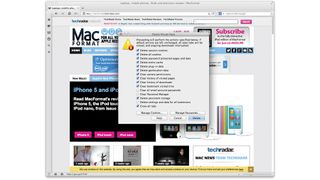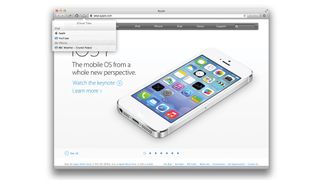Best Mac browser: pick the best Safari alternative for you
We pitch Apple's browser against the popular alternatives
One of the things it does offer is a 'turbo' mode for slower internet connections. Opera Turbo mode compresses website data on Opera's servers prior to serving it to you, which means it downloads more quickly. When you're back on a fast network it automatically switches off. With websites now becoming more code-heavy, this can be a real bonus when your bandwidth is limited, say for example when travelling abroad.
Like other browsers, Opera is able to synchronise your data across various systems using something it calls Opera Link. You can link up your bookmarks and passwords across all your devices, which is useful here since Opera is supported on more devices than practically any other browser when you factor in non-smartphones. It's nice to look at too, with a system of 'panels' providing quick and easy access to functions like downloads, bookmarks, history and even notes.
Everything is searchable so it's simple to find what you want even if you're looking for a site you visited weeks ago.
Big on security

When it comes to security, Opera is no slouch and regularly checks lists of malicious sites and warns you if you try to visit them. It also lets you surf without being tracked, and enables you to use private tabs and windows. You can clear your browsing history and manage lists of trusted websites. Plus, you can set a master password for Opera and tell it to prompt for it at intervals.
Content settings can be adapted to specific lists of sites, so for example, you could make certain sites always display in a larger font, and others have ads or Flash content blocked. The default setup is good so you don't need to alter this stuff if you don't want, but the option is there if you do.
Opera can be themed and extended with add-ons, available through the add-ons page. Here you can customise the way that the browser behaves, adding functionality, such as the ability to view pages as text-only and strip out extraneous formatting, download YouTube and other videos and block connections to Facebook from third-party sites, preventing you from seeing embedded Facebook code on websites other than Facebook.
Apple Safari
Ultimately, there are lots of reasons to use Apple's own broswer; here are some!

Although Apple's own browser may still seem the same since its release, it's been all-change under the hood. For a while, compatibility was an issue, with some sites not functioning that well in Safari. But that was in the days when Internet Explorer was still de facto standard for testing sites.
Now, the playing field is more even, with IE slipping down the rankings, displaced by Chrome, Firefox and, in the mobile arena, by Safari. So why, when trying to persuade you to look at alternatives to Safari, would we actually recommend it?
Well the truth is it's an excellent browser: our goal here isn't to say that one is necessarily the best, just to point out that they all have their own strengths, and that some might suit you better than others.
Top of the list of Safari's plus points has to be the fact that it is designed by Apple. That's not just us being Apple fans, there's a more serious point behind it. Making Safari as part of OS X means that Apple is able to streamline it as efficiently as possible and to give it hooks into other parts of the system like iCloud that it simply does not allow to other developers.
Like Microsoft does with Internet Explorer, Safari is actually integrated into OS X at a much more fundamental level than you might imagine. Apps like the App Store and iTunes Store are all based on some derivation of the browser, and when Maps comes to OS X Mavericks, that's likely to have elements of Safari in too. So it's in Apple's interests to keep Safari fast, lean and up-to date, with its Nitro JavaScript engine optimised for multiple cores.
Get daily insight, inspiration and deals in your inbox
Get the hottest deals available in your inbox plus news, reviews, opinion, analysis and more from the TechRadar team.
